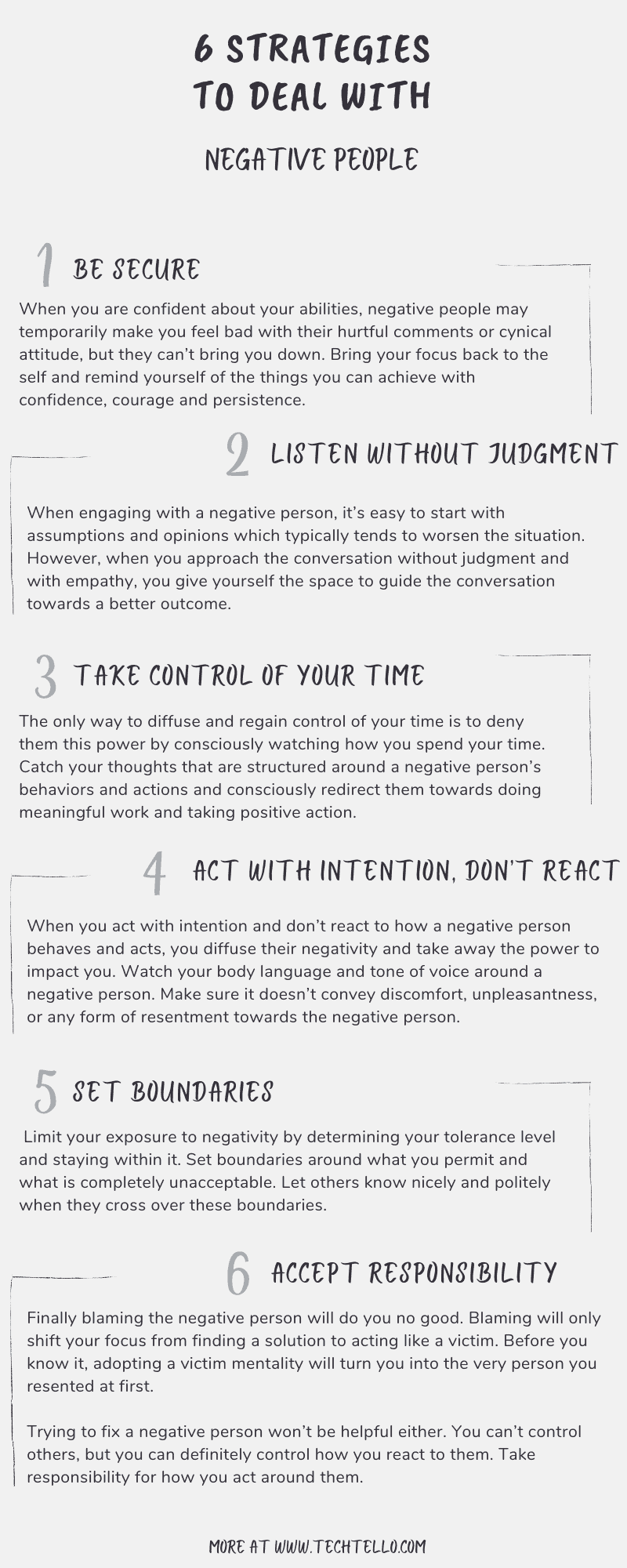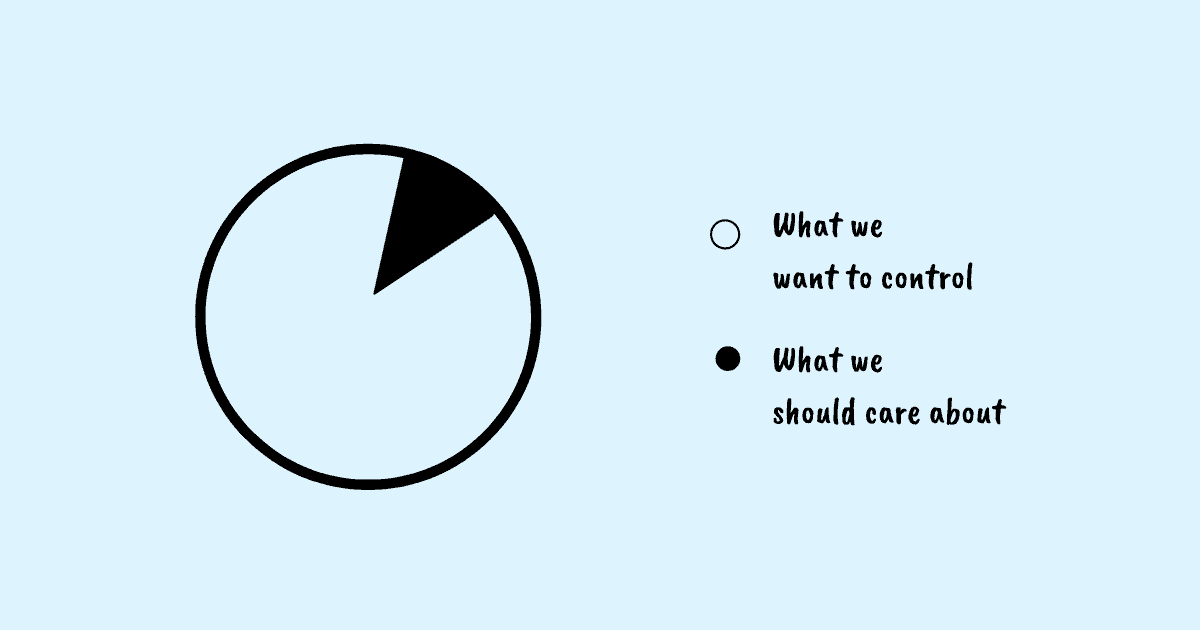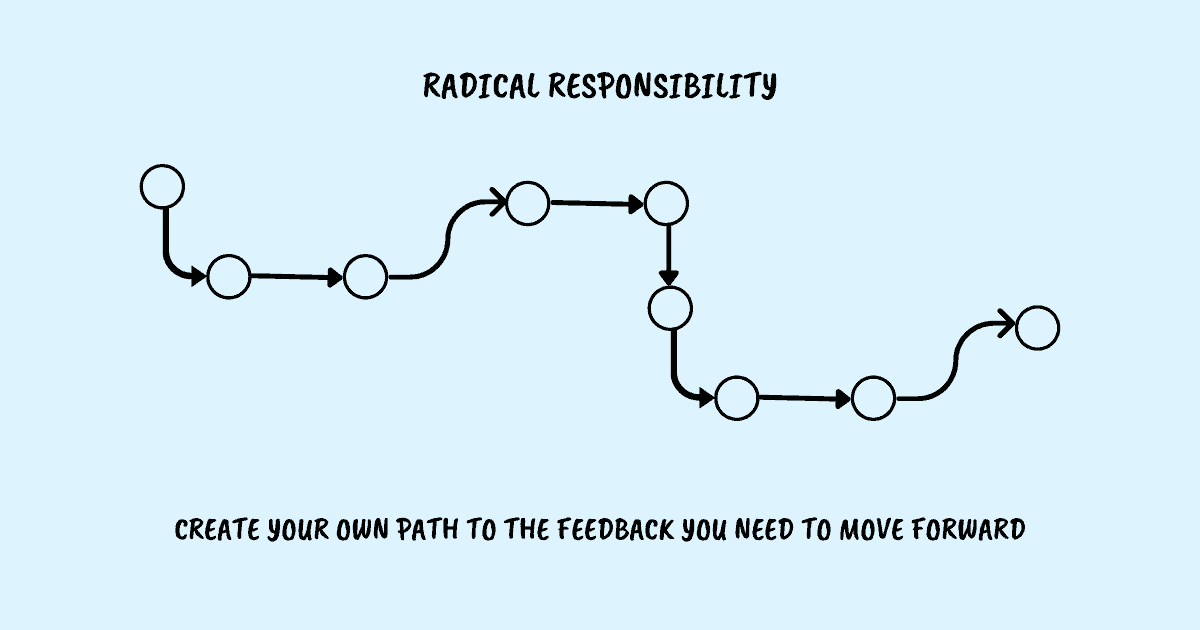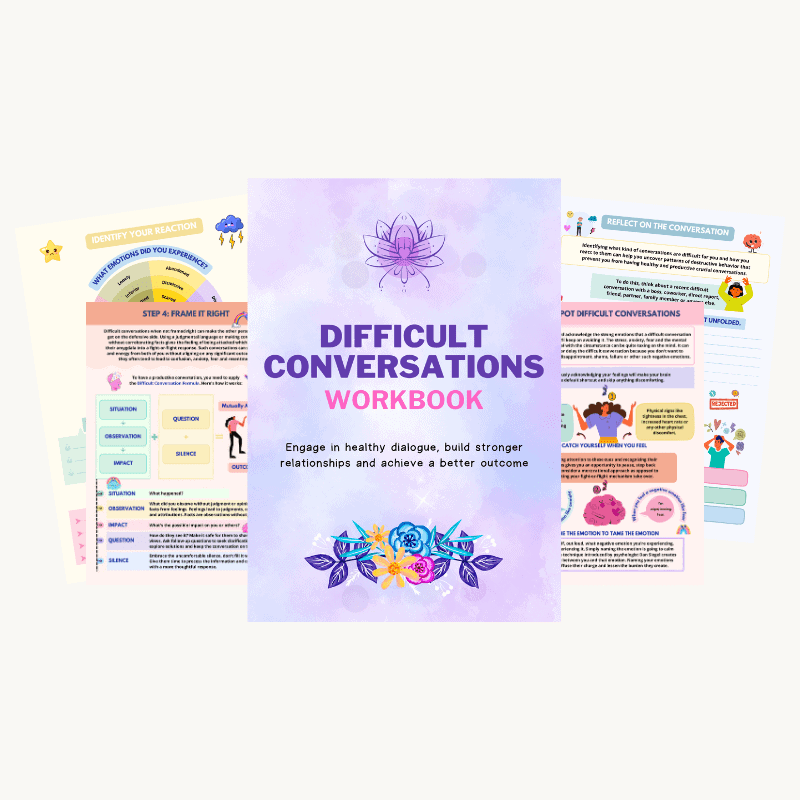How to Deal With Negative People Without Going Crazy
If you are around one of those people who have the tendency to constantly complain, who turn a perfectly good outcome into an unsatisfactory one with their negative outlook, those who are overly critical or bring out the worst in others with their offensive comments, toxic behavior and pessimistic attitude towards everything, chances are these negative people are already controlling your emotions and limiting what you can achieve.
Think for a moment. Do any of these apply to you:
- Do you spend a significant amount of your time complaining about them instead of using that time to put into constructive action?
- Do you overthink by playing the conversation with the negative person in your mind over and over again?
- Do you feel strong emotions and experience high levels of discomfort at the mere thought of facing them again?
- Do you tend to be a different person around them by behaving in ways that don’t match your values?
- Do you find it hard to calm down after meeting them?
- Do they often drive you crazy, taking away your ability to think and act rationally?
The more time you spend thinking, complaining, and agonizing over the negative person, the more power you allow them to claim over your life. By giving them too much power over what you experience, how you feel and the way you act, you let these negative people dictate how you spend your day and time.
Negativity can be contagious. It may not be obvious at first, but it’s easy to get trapped into a negative person’s way of thinking if you are not careful around them. Left unhandled, their cynical, gloomy, and defeatist behavior can emotionally drain you, impact your productivity, and turn you into the very person you hated at first.
Mike Bechtle writes in People Can’t Drive You Crazy If You Don’t Give Them the Keys, “We won’t be able to eliminate the drama in our lives or escape all the crazies. But we can actually learn to live responsively instead of reactively, being positive when others are negative.”
6 strategies to deal with negative people
1. Be secure
When you are confident about your abilities, negative people may temporarily make you feel bad with their hurtful comments or cynical attitude, but they can’t bring you down.
They cannot inflict self-doubt and prevent you from pursuing the things you desire because their negative attitude is a reflection of their own insecurities and in no way limits what you can and cannot achieve.
As a rule: When you find yourself getting extremely bothered by their behavior, bring your focus back to the self and remind yourself of the things you can achieve with confidence, courage and persistence.
2. Listen without judgment
When engaging with a negative person, it’s easy to start with assumptions and opinions which typically tends to worsen the situation.
However, when you approach the conversation without judgment and with empathy, you give yourself the space to guide the conversation towards a better outcome.
Douglas Stone writes in Difficult Conversations “You can’t move the conversation in a more positive direction until the other person feels heard and understood. And they won’t feel heard and understood until you’ve listened.”
By listening intently to what they have to say, you can identify if they actually need your advice or they simply want to be heard. Giving unsolicited advice to a negative person who’s in no mood for it will only backfire.
Another advantage of listening without judgment is that it enables you to redirect the conversation by talking about the future and the steps they can take while letting go of things that happened in the past. Ask them questions to help them shift from a negative line of thinking to a positive one. Reframing negative language helps shift focus towards learning that came from those experiences and use them to design a better future.
For example: If they rant about how their boss makes their life miserable, ask them about the steps they have taken to fix their situation. If they speak negatively about an outcome, ask them about what they would do differently to achieve a better outcome. If they keep telling you why something may not work out, ask them about the changes they would make to turn it into a possibility.
As a rule: Stop judging their negative attitude and behavior and look for ways to contribute positively to the conversation.
3. Take control of your time
David Rock writes in Your Brain at Work, “We all often think about what’s easy to think about, rather than what’s right to think about.”
Negative people consume so much of your mental energy that you fail to realize how much of your time you spend thinking and lamenting their behaviors and actions even when they are not around.
Ever found yourself thinking over and over again about a particular conversation with a negative person:
- Why did she say this? Does she not trust me?
- Why would he behave this way?
- Did I do something wrong for her to be so mean and negative towards my idea?
You can get so emotionally consumed with how they behave and what they say that you let them suck into your productive time. Giving them control over your emotions and thought process increases their power over the way you lead your life.
The only way to diffuse and regain control of your time is to deny them this power by consciously watching how you spend your time.
As a rule: Catch your thoughts that are structured around a negative person’s behaviors and actions and consciously redirect them towards doing meaningful work and taking positive action.
4. Act with intention, don’t react
When you act with intention and don’t react to how a negative person behaves and acts, you diffuse their negativity and take away the power to impact you.
Ask for time to be clear-headed and handle them gracefully when you have the option to do so. You don’t have to react to their negativity with a thoughtless response. Carefully and tactfully handle them. The less you care about their negative behavior, the more you will gain the power to guide yourself towards constructive action.
Eventually, when they see that it doesn’t impact you, they may learn to stop their rants and take them elsewhere.
As a rule: Watch your body language and tone of voice around a negative person. Make sure it doesn’t convey discomfort, unpleasantness, or any form of resentment towards the negative person.
Self-Compassion Workbook
Cultivate kindness and strength in the face of difficulty and foster a new, more gentle and loving perspective on your struggles.
5. Set boundaries
All the strategies I have mentioned so far work only to a certain extent because all of us have a limit to the amount of negativity we can tolerate. Unless you are careful about the amount of negativity you are letting into your life, at some point it can get the better of you.
Set boundaries around what you permit and what is completely unacceptable. Let others know nicely and politely when they cross over these boundaries. Take proactive steps to stay away from negativity by limiting exposure and saying no to activities where such emotions tend to run high.
Brene Brown writes in The Gifts of Imperfection, “When we fail to set boundaries and hold people accountable, we feel used and mistreated. This is why we sometimes attack who they are, which is far more hurtful than addressing a behavior or a choice.”
One trick that has always worked for me when trying to control my response towards a negative person is to say “I am not able to think clearly at the moment. We can probably connect back later and discuss this further.” It gives me the time to craft a careful response as well as the space I need to prevent myself from overreacting to their behavior or saying things that I tend to repent later.
As a rule: Limit your exposure to negativity by determining your tolerance level and staying within it.
6. Accept responsibility
Finally blaming the negative person will do you no good. Blaming will only shift your focus from finding a solution to acting like a victim. Before you know it, adopting a victim mentality will turn you into the very person you resented at first.
Trying to fix a negative person won’t be helpful either. You can’t control others, but you can definitely control how you react to them. Take responsibility for how you act around them.
By taking responsibility, you act within your circle of influence where you have the power to control your thoughts and align your actions in a positive direction.
Ryan Holiday writes in The Obstacle Is the Way “Focusing exclusively on what is in our power magnifies and enhances our power. But every ounce of energy directed at things we can’t actually influence is wasted—self-indulgent and self-destructive.”
As a rule: Focus on what’s within your control and stop worrying about things you can’t.
Circle of Control Workbook
Let go of negativity and rumination by embracing things within your control.
Summary
- You can’t completely avoid negative people in your life, but you can learn to work with them.
- If you don’t consciously act around negative people, you give them the power to control your emotions thereby impacting how you feel and what you achieve.
- The first step to deal with a negative person is to feel confident. When you are secure about your own abilities and skills, a negative person cannot pull you down.
- Next, listen intently to what they have to say. Without judgments, you create opportunities to shift them from a problem mode to a solution mode.
- Consciously prioritize how you spend your time. By investing in constructive action, you take away their power to eat up into your productive time.
- Diffuse their negativity by carefully and tactfully handling them with a well thought out response. The less impact they have on you, the less they will be tempted to share their rants, cynicism, and defeatist behavior with you.
- Set boundaries to continue being effective. No one can tolerate extreme negativity without being impacted. Know your limits.
- Finally, shift from blaming the other person to taking responsibility for your reaction. You can’t change the other person, but you can certainly change how you act around them.































Like this site
Thanks for this article! I’m going to really try to implement your strategy with my work environment but most especially with my family members. Thinking through rather than reacting through is essential. I will also look into your books. Keep up the great work!
Thank you Jan!
Glad I stumbled upon this. 😉 No. 4 is indeed the best advise. Easier said than done.
Thank you for reading Sylvia!
Great article! Thanks you!